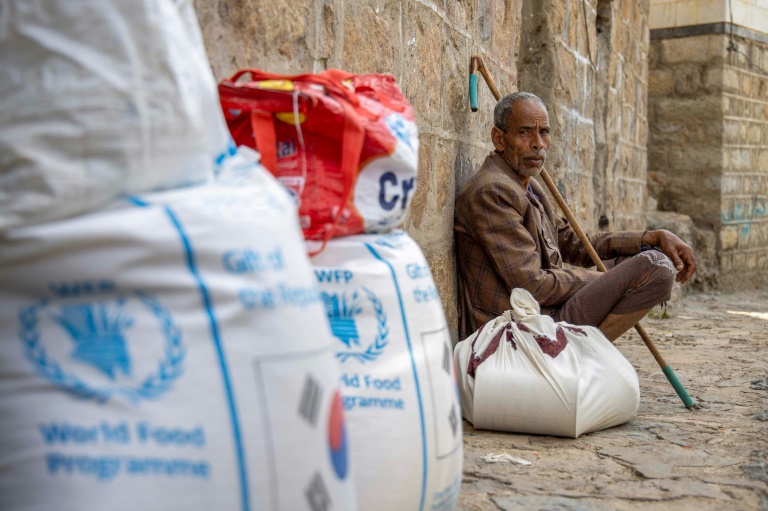Yemen aid groups say Red Sea crisis driving up costs

Displaced civilians in the Yemeni city of Taez receive humanitarian aid provided by the World Food Programme (WFP)
Dubai – Aid groups working in Yemen are warning of rising shipping costs and delivery delays due to the Red Sea attacks by Huthi rebels which threaten to aggravate one of the world’s worst humanitarian crises.
After nine years of conflict, more than half of Yemen’s population requires humanitarian assistance, according to the United Nations, with severe funding shortages hampering the response.
A spate of attacks on commercial vessels by Yemen’s Huthis since November has further compounded the country’s woes, as shipping companies face higher costs as they detour around southern Africa to avoid the Red Sea.
The Iran-backed rebels say their campaign is in solidarity with Palestinians in the Israel-Hamas war.
The World Food Programme said it is already feeling the knock-on effects of the escalation, which has also seen US and UK strikes on Huthi military targets.
“As the security situation in the Red Sea continues to deteriorate, WFP is facing increased shipping costs as well as potential delivery delays,” the UN agency said in a report this week.
“The food security situation is expected to deteriorate over the coming months,” WFP said, adding that the war-torn country depends on imports for 90 percent of its food needs.
The Red Sea attacks have raised insurance premiums for shipping companies, forcing many to avoid the vital route that normally carries about 12 percent of global maritime trade.
According to the International Monetary Fund, Red Sea traffic has already dropped by at least 30 percent this year as a result of the attacks.
– ‘Already seeing delays’ –
Many companies are opting for a lengthy detour around Africa, which adds considerable fuel and other costs that can trickle down to consumer goods.
WFP said it is facing higher shipping costs because of “increased freight and insurance rates, and extra fuel costs”, without specifying the route aid ships are taking.
The International Rescue Committee, another aid group working in Yemen, said it was “already seeing delays in shipments of lifesaving commodities, including pharmaceuticals, due to the military escalation”.
The organisation is still delivering at full capacity because of its stockpiles of aid, said Anya Cowley, the IRC’s policy, advocacy and communications coordinator for Yemen.
But it is beginning to see “rising inflation, and increased costs of basic commodities in local markets such as food and fuel”, she told AFP.
“If the situation in the Red Sea escalates, the ability of humanitarian organisations like IRC to provide humanitarian assistance may be impacted,” Cowley added.
The Arabian Peninsula’s poorest country has been gripped by conflict since the Huthis overran the capital Sanaa in 2014, triggering a Saudi-led military intervention in support of the government the following year.
Hundreds of thousands have died in fighting or from indirect causes such as lack of food in what the UN has called one of the world’s worst humanitarian catastrophes.
“The humanitarian crisis is as bad as ever,” said Dalila Mahdawi of the International Committee of the Red Cross.
– Terror listing –
After the United States last month said it was relisting the Huthis as a “terrorist” organisation, Mahdawi said there were concerns the designation would further endanger the humanitarian response.
She said it was too early to tell how this would affect the supply of aid as the US has promised to minimise the impact on humanitarian groups.
“We have seen with previous designations like this that humanitarian exemptions are critical to allowing the continuation of the provision of aid so we hope this will be agreed in this situation as well,” Mahdawi, the ICRC’s head of communications for Yemen, told AFP.
According to the UN Office for the Coordination of Humanitarian Affairs (OCHA), Yemen is experiencing some of the highest malnutrition rates ever recorded, with more than 17 million facing food insecurity.
Nearly half of all children under five are suffering moderate to severe stunting, it said.
Last week, OCHA launched an appeal for $4 billion in aid for Yemen this year following funding shortfalls that have forced several organisations to cut assistance.
In January, 26 aid groups working in Yemen issued a joint statement warning that the impact of the Red Sea escalation is already being felt by humanitarian groups.
“Disruption to trade is pushing up prices and causing delays in shipments of lifesaving goods,” said the groups including CARE, the Norwegian Refugee Council and Save the Children.
